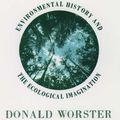![Cover Art for B0021RF8H0, [( Wealth of Nature: Environmental History and the Ecological Imagination )] [by: Donald Worster] [Oct-1994] by Donald Worster](https://bn.bkocdn.info/covers/64b33d20fda538e/v/300.jpeg)
The Wealth of Nature: Environmental History and the Ecological Imagination
Donald Worster
Hailed as "one of the most eminent environmental historians of the West" by Alan Brinkley in The New York Times Book Review, Donald Worster has been a leader in reshaping the study of American history. Winner of the prestigious Bancroft Prize for his book Dust Bowl, Worster has helped bring humanity's interaction with nature to the forefront of historical thinking. Now, in The Wealth of Nature, he offers a series of thoughtful, eloquent essays which lay out his views on environmental history, tying the study of the past to today's agenda for change. The Wealth of Nature captures the fruit of what Worster calls "my own intellectual turning to the land." History, he writes, represents a dialogue between humanity and nature--though it is usually reported as if it were simple dictation. Worster takes as his point of departure the approach expressed early on by Aldo Leopold, who stresses the importance of nature in determining human history; Leopold pointed out that the spread of bluegrass in Kentucky, for instance, created new pastures and fed the rush of American settlers across the Appalachians, which affected the contest between Britain, France, and the U.S. for control of the area. Worster's own work offers an even more subtly textured understanding, noting in this example, for instance, that bluegrass itself was an import from the Old World which supplanted native vegetation--a form of "environmental imperialism." He ranges across such areas as agriculture, water development
Booko found 2 book editions
Product filters
| Product |
Details
|
Price
|
New
|
Used
|
|---|---|---|---|---|
|
New: Being refreshed...
Used: Being refreshed...
|
New: Being refreshed...
Used: Being refreshed...
|
Being refreshed... | Being refreshed... | |
|
|
New: Being refreshed...
Used: Being refreshed...
|
New: Being refreshed...
Used: Being refreshed...
|
Being refreshed... | Being refreshed... |
Booko collects this information from user contributions and sources on the internet - it is not a definitive list of editions. Search Booko for other editions of The Wealth of Nature: Environmental History and the Ecological Imagination.
![Cover Art for B0021RF8H0, [( Wealth of Nature: Environmental History and the Ecological Imagination )] [by: Donald Worster] [Oct-1994] by Donald Worster](https://bn.bkocdn.info/covers/64b33d20fda538e/v/120x120.jpeg)




















